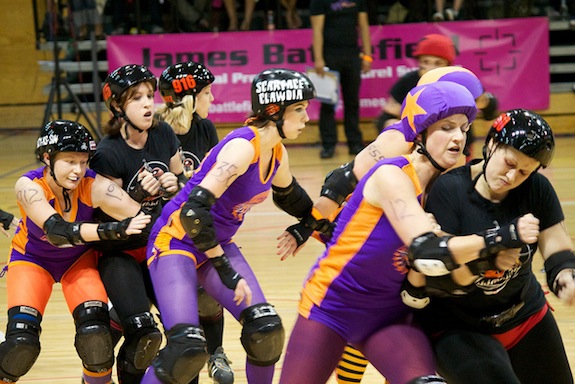Roller Derby Players Go Home With Bruises And a New Microbiome
Roller derby players come home with lots of bruises, scrapes and aches. But they also come home with an altered microbiome

Image: Kristina D.C. Hoeppner
Roller derby players come home with lots of bruises, scrapes and aches. But they also come home with an altered microbiome, according to recent research from the University of Oregon. For the study, published in PeerJ, researchers swabbed the skin on roller derby teams before and after a bout. Here’s what they write:
We conducted a study during a flat track roller derby tournament, and found that teammates shared distinct skin microbial communities before and after playing against another team, but that opposing teams’ bacterial communities converged during the course of a roller derby bout. Our results are consistent with the hypothesis that the human skin microbiome shifts in composition during activities involving human to human contact, and that contact sports provide an ideal setting in which to evaluate dispersal of microorganisms between people.
Not only are roller derbyers swapping hits, they are swapping germs too. Before a bout, the players within a team shared much of their microbiome. After the bout, however, they had swapped lots of microbes with their opponents. Which isn’t really all that surprising given the amount of bodily contact that happens at one of these bouts. But the researchers were surprised at just how clear their results were. James F. Meadow, the lead researcher, told the Los Angeles Times:
We did expect to see something there, but we didn’t expect it to be so clear-cut. We could have taken one player at random before they played against each other, and I could have told you which team she’d played for with pretty good confidence, just by looking at bacteria on the upper arm.
But then after they had played against one another that became a lot more difficult, because there was a lot more in common.
Understanding how athletes might swap microbes could serve as a good proxy for other close human interactions—al
More from Smithsonian.com:
Roller Derby’s Sisterhood
Want to Be Healthy? Manage Your Microbes Like a Wildlife Park
/https://tf-cmsv2-smithsonianmag-media.s3.amazonaws.com/accounts/headshot/Rose-Eveleth-240.jpg)
/https://tf-cmsv2-smithsonianmag-media.s3.amazonaws.com/accounts/headshot/Rose-Eveleth-240.jpg)